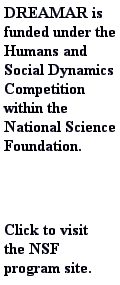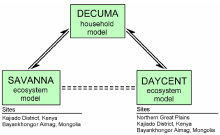
|
 |

Drylands, a portion of the
globe's rangelands. (Millennium Ecosystem Assessment 2005)
|
Rangelands comprise about 25% of the earth's surface and these
landscapes support more than 20 million people and most of the
world's charismatic megafauna. Most of the people who live in
these regions of the world herd domestic livestock and some do
limited cultivation so they are dependent directly on the
environment for their livelihoods. But change is rapidly changing
the environments upon which these people depend through such
factors as population pressures, land use and land tenure changes,
climate variability, and policy changes which affect their
ability to earn a living. This project is about understanding
uncertainty and change in this linked human-environment system.
One of the few viable ways of studying this is through an integrated
modeling approach based on an appropriate theoretical framework
that makes use of extensive empirical research.

Agent-based model DECUMA will join with SAVANNA and DAYCENT.
|
Through the development of agent-based modeling efforts linked to
ecological models we will investigate the societal factors that
enable households in these systems to make land use decisions so
they can be resilient to uncertainty. Decisions that people make
are expressed in land use and it is here that we will look at the
effects of those decisions on ecosystem services. In other words,
what is the ability of people to cope with change so that the
social system and the ecological system can still provide
for people and the animals that inhabit these systems? Thus it
is important that we link a household model to ecological models.
With work we have done in Mongolia, the northern U.S. Great Plains
and in East Africa we will investigate the human-ecological effects
in the face of change.

DREAMAR study areas. Click the image to learn more about the sites.
|
Why is this important? Research that focuses on household and
community behavior is important because it is at that level where
fundamental decisions are made regarding events and changes and it
is here where resilience is manifested. The notion that broad
recommendation domains can be identified for a broad set of people
coping with change is becoming increasingly hard to believe given
the spatial and temporal heterogeneity of the systems we are
looking at, and the complexity of the world we now live in.
In the future we are going to have to be much smarter in the way
that we match potential “clients” with potential policy or technical
interventions. The only way the research community is going to make
great progress in attaining objectives that do confer resilience
(on social and ecological systems) is through much better targeting
ability, a large part of which seem to be intimately entwined with
understanding how households make decisions.

Relationships between households, ecosystems, and policy makers. In
DREAMAR, we seek to learn more about how decision making by households
contributes to viability and resiliency.
|

|





